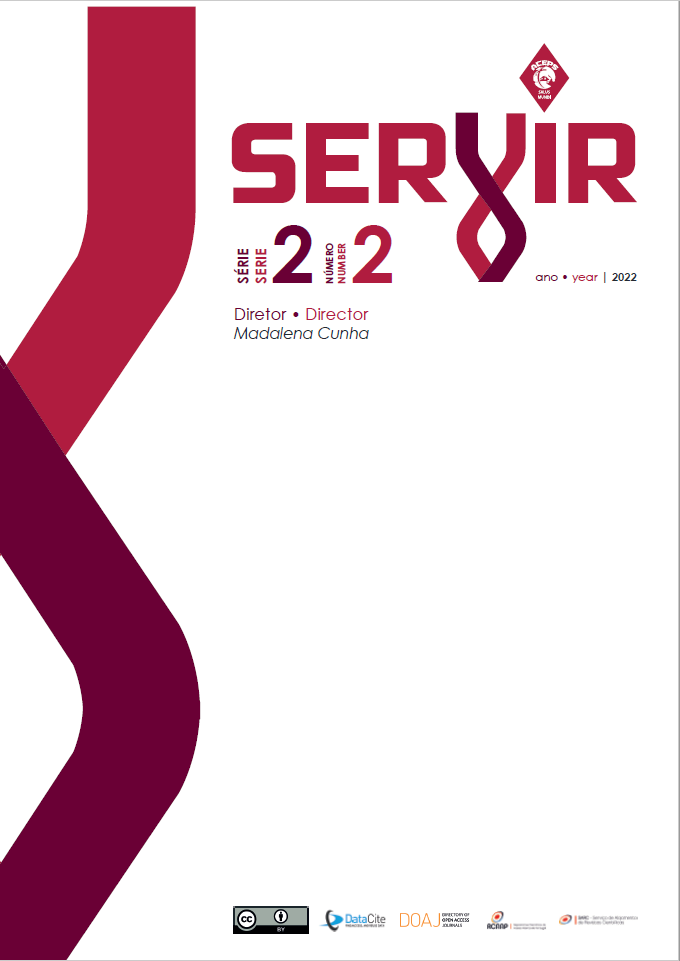Processo de luto em familiares e pessoas significativas de vítimas de SARS-CoV-2
DOI:
https://doi.org/10.48492/servir0202.27314Palavras-chave:
Luto, Infeções por Coronavírus (COVID-19), FamíliaResumo
Introdução: As restrições impostas pela pandemia SARS-CoV-2 dificultam a vivência dos processos de luto e a resolução de todas as suas fases, porquanto as pessoas “perderam” o direito de acompanhar os seus entes queridos na fase terminal e aos tradicionais rituais do velório.
Objetivo: Identificar as condições em que decorrem os rituais fúnebres em contexto de pandemia por SARS-CoV-2 e determinar a prevalência de luto patológico.
Métodos: Estudo observacional e descritivo, com foco transversal. A técnica de amostragem foi em bola de neve, constituída por 86 participantes, tendo sido aplicado como instrumentos de recolha de dados um questionário ad hoc relativo às variáveis sociodemográficas e de contexto de luto e o Inventory of Complicated Grief (ICG).
Resultados: 52 participantes (60,5%) apresentaram um score superior a 25 pontos no ICG, evidenciando um processo de luto complicado. Apesar de não se constatar uma relação estatisticamente significativa entre o desenvolvimento de luto patológico e as condições em que decorrem os rituais fúnebres em contexto de pandemia por SARS-CoV-2, há fortes indícios que as pessoas que perdem familiares e amigos vítimas de COVID-19 e que se veem impossibilitados de acompanhar antes e após morte acarretam processos de luto complicado.
Conclusão: Os participantes apresentam uma elevada probabilidade de desenvolver processos de luto complicado, pelo que as medidas de apoio psicológico que devem ser implementadas incluem programas de apoio e acompanhamento das famílias enlutadas, orientar para psicoterapia as pessoas que apresentem sintomatologia persistente e procurar a nível institucional operar mudanças comportamentais e processuais na gestão de processos de doença e morte, no âmbito da pandemia.
Downloads
Referências
American Psychiatric Association. (2013). Diagnostic and Statistical Manual of Mental Disorders: DSM-5 (5th ed.). Library of Congress Cataloging-in-Publication Data. http://repository.poltekkes-kaltim.ac.id/657/1/Diagnostic%20and%20statistical%20manual%20of%20mental%20disorders%20_%20DSM-5%20%28%20PDFDrive.com%20%29.pdf
Bianco, A. C. L. & Costa-Moura, F. (2020). Covid-19: Luto, morte e a sustentação do laço social TT - Covid-19: Mourning, Death and Sustaining the Social Bond TT - Covid-19: duelo, muerte y sostenimiento del vínculo social. Psicol. Ciênc. Prof, 40, e244103–e244103. http://www.scielo.br/scielo.php?script=sci_arttext&%0Apid=S1414-98932020000100656
Cardoso, E. A. O., Silva, B. C. A., Santos, J. H., Lotério, L. D. S., Accoroni, A. G., & Santos, M. A. (2020). The effect of suppressing funeral rituals during the covid-19 pandemic on bereaved families. Revista Latino-Americana de Enfermagem, 28, 1–9. https://doi.org/10.1590/1518-8345.4519.3361
Crepaldi, M. A., Schmidt, B., Noal, D. da S., Bolze, S. D. A., & Gabarra, L. M. (2020). Terminalidade, morte e luto na pandemia de COVID-19: demandas psicológicas emergentes e implicações práticas. Estudos de Psicologia (Campinas), 37. https://doi.org/10.1590/1982-0275202037e200090
Dantas, C., Azevedo, R., Vieira, L., Côrtes, M., Federmann, A., Cucco, L. & Cassorla, R. (2020). O luto nos tempos da COVID-19: desafios do cuidado durante a pandemia. Revista Latino Americana de Psicopatologia Fundamental, 23(3), 509-533. https://www.scielo.br/scielo.php?pid=S1415-47142020000300509&script=sci_arttext.
Delalibera, M., Coelho, A., & Barbosa, A. (2011). Validação do instrumento de avaliação do luto prolongado para a população portuguesa. Acta Médica Portuguesa, 24(6), 935–942. https://www.researchgate.net/publication/227395255_Validation_of_prolonged_grief_disorder_instrument_for_Portuguese_population
Eisma, M. C., Tamminga, A., Smid, G. E. & Boelen, P. A. (2020). Acute grief after deaths due to COVD-19, natural causes and unnatural causes: na empirical. Journal of Affective Disorders, 278, 54-56. https://doi.org/10.1016/j.jad.2020.09.049
Fuchs, T. (2018). Presence in Absence: the ambiguous phenomenology of Grief. Phenomenology and the Cognitive Sciences, 17, 43-63. DOI:10.1007/s11097-017-9506-2
Hart, J. L., & Taylor, S. P. (2021). Family Presence for Critically Ill Patients During a Pandemic. Chest, 160(2), 549–557. https://doi.org/10.1016/J.CHEST.2021.05.003.
Marques, J. F. P. (2020). Luto Patológico – Revisão baseada na melhor evidência [Trabalho final Mestrado Integrado em Medicina, Universidade de Lisboa]. Repositório da Universidade de Lisboa. https://repositorio.ul.pt/bitstream/10451/42230/1/JoanaPMarques.pdf
Magalhães, J. R. F. de, Soares, C. F. S. e, Peixoto, T. M., Estrela, F. M., Oliveira, A. C. B. de, Silva, A. F. da, & Gomes, N. P. (2020). Implicações sociais e de saúde que acometem pessoas enlutadas pela morte de familiares por Covid-19. Revista Baiana de Enfermagem 8(1), 34. https://doi.org/10.18471/rbe.v34.37007
Mayland, C. R., Harding, A. J. E., Preston, N. & Payne, S. (2020). Supporting Adults Bereaved Through COVID-19: A rapid review of the impact of previous pandemics on grief and bereavement. Journal of Pain and Symptom Management, 60(2), 33-39. https://doi.org/10.1016/j.jpainsymman.2020.05.012
Neimeyer, R. A. (2019). Meaning reconstruction in bereavement: development of a research program. Death Studies, 43(2), 79–91. https://doi.org/10.1080/07481187.2018.1456620
Oliveira, A. C. Lucas, T. C., & Iquiapaza, R. A. (2020). O Que a Pandemia Da Covid-19 Tem Nos Ensinado Sobre Adoção De Medidas De Precaução? Texto & Contexto Enfermagem, 29, 13. https://doi.org/https://doi.org/10.1590/1980-265X-TCE-2020-0106
Pacheco, D. N. C. (2010). Modelo preditor de luto complicado 6 meses após a perda de um familiar. [Dissertação de Mestrado]. Instituto Superior de Ciências da Saúde, Norte. https://repositorio.cespu.pt/bitstream/handle/20.500.11816/150/Duarte%20Pacheco.pdf?sequence=1
Pestana, M. G. & Gageiro, J. N. (2008). Análise de Dados para Ciências Sociais. A complementaridade do SPSS. 5ª edição revista e corrigida. Lisboa, Edições Sílabo, pp. 527-528.
Shear, M. K. (2015). Complicated Grief. New England Journal of Medicine, 372(2), 153–160. doi: 10.1056/NEJMcp1315618
Sizoo, E. M., Monnier, A. A., Bloemen, M., Hertogh, C. M. P. M., & Smalbrugge, M. (2020). Dilemmas With Restrictive Visiting Policies in Dutch Nursing Homes During the COVID-19 Pandemic: qualitative analysis of an open-ended questionnaire with elderly care physicians. Journal of the American Medical Directors Association, 21(12), 1774 1781.e2. https://doi.org/10.1016/J.JAMDA.2020.10.024
Stroebe, M., Schut, H., & Stroebe, W. (2007). Health outcomes of bereavement. The Lancet, 370, 1960–1973. doi: 10.1016/S0140-6736(07)61816-9
Stroebe, M.& Schut, H. (2021). Bereavement in times of COVID-19: a review and theoretical framework. OMEGA- Journal of Death and Dying, 82(3), 500–522. https://doi:10.1177/0030222820966928
Tavares, P. H. (2012). Luto e melancolia. Revista Brasileira de Psicanálise, 46(4), 212-216. http://pepsic.bvsalud.org/scielo.php?script=sci_arttext&pid=S0486-641X2012000400020&lng=pt&tlng=pt.
Downloads
Publicado
Como Citar
Edição
Secção
Licença
No intuito de promover a livre circulação do conhecimento, a Servir funciona em regime de acesso livre (open access). Todo o seu conteúdo está disponível e protegido sob a licença Creative Commons (CC BY 4.0).
A revista permite o auto-arquivo em repositórios institucionais de todas as versões, podendo ficar imediatamente disponíveis.






